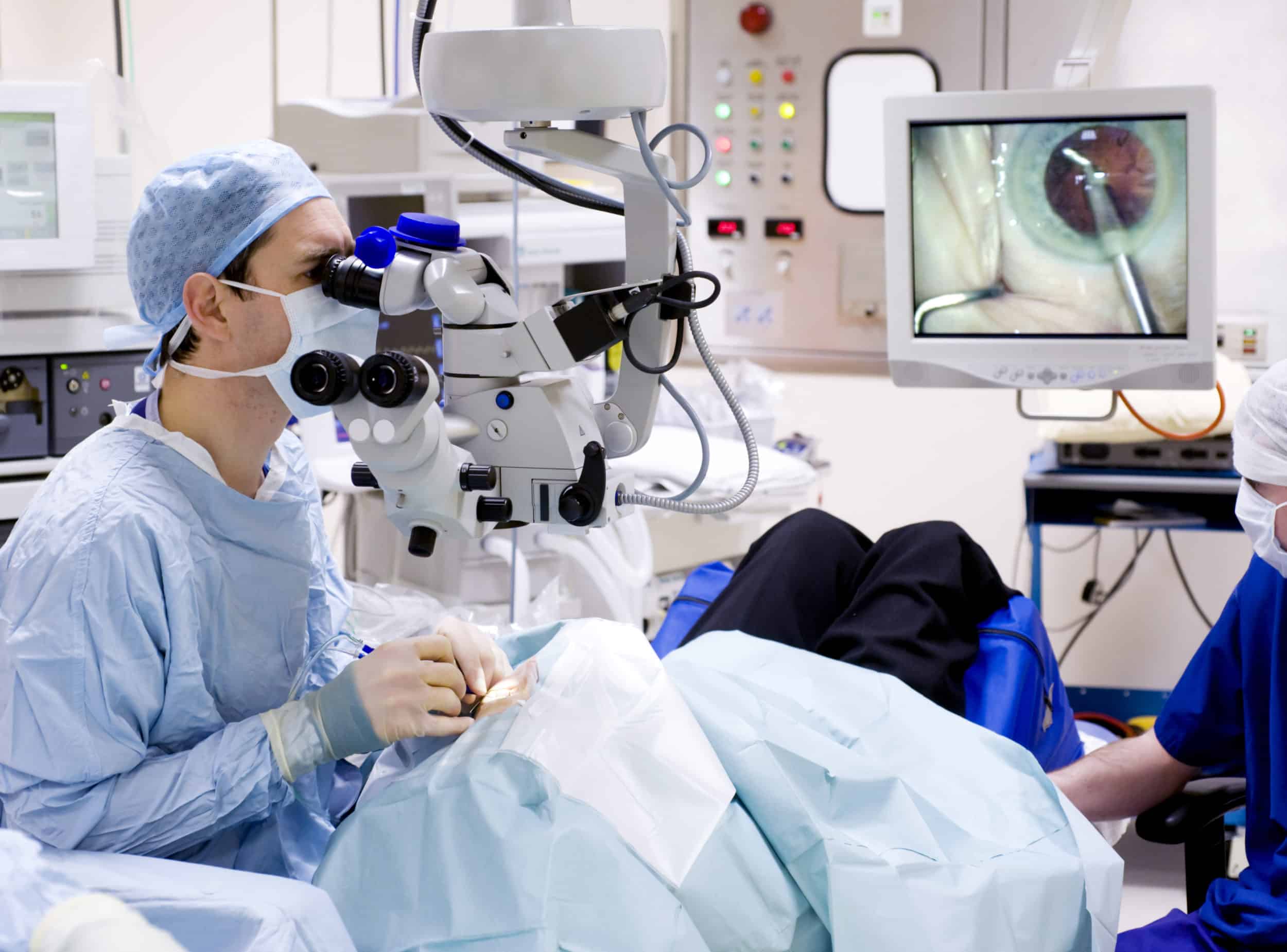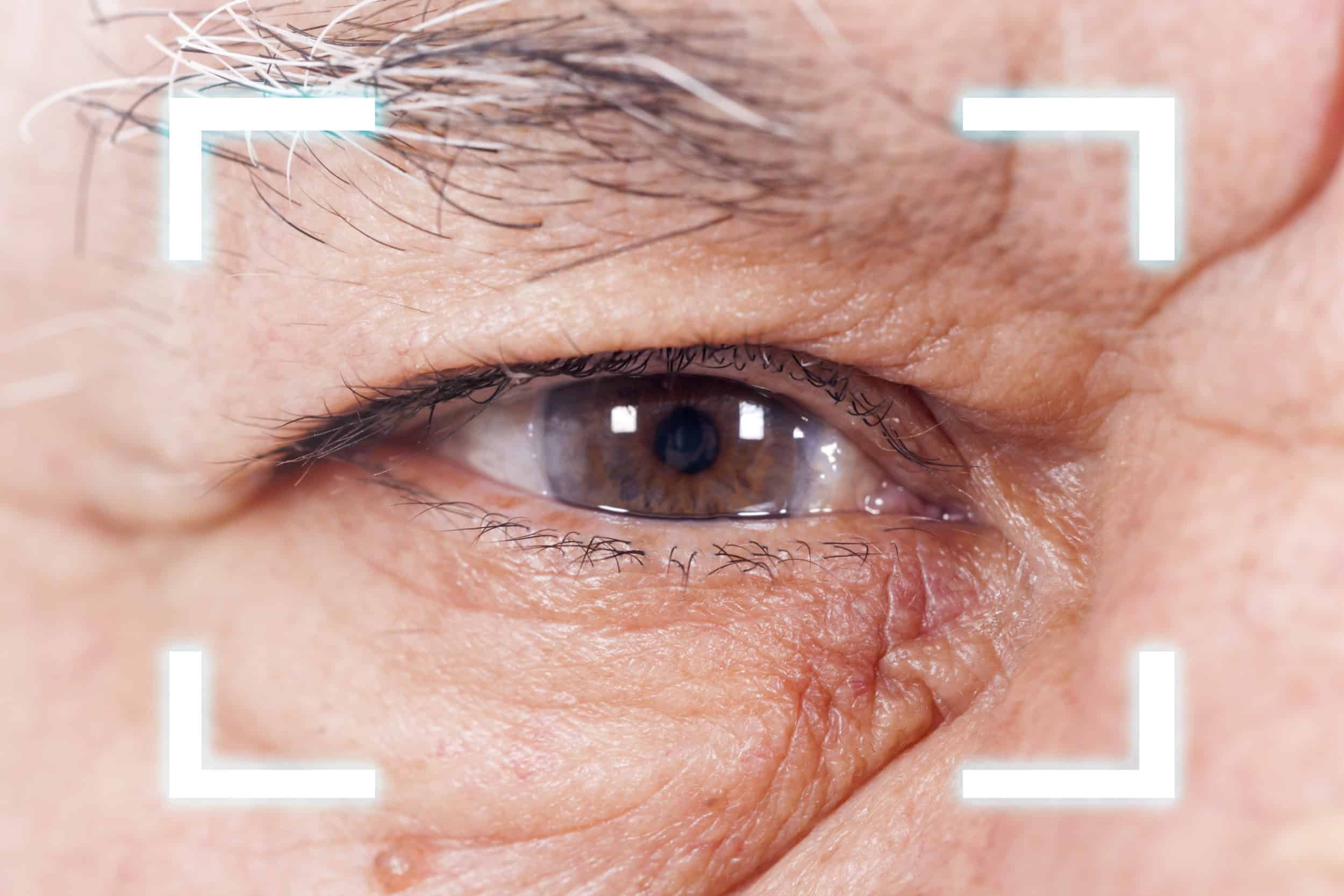What Are Cataracts?
At the front of each eye, there is a lens that light passes through. As we age and proteins in the eye begin to deteriorate, tiny protein particles may clump together on the lens of one or both eyes. As a result of protein accumulation, the lens becomes cloudy. The clouding on the lens is what we refer to as cataracts.

What Are the Symptoms of Cataracts?
In early stages, a cataract may simply cause simple blurring and a need to change spectacles. Eventually, however, patients with cataract experience painless and progressive reduction of sight resulting in significant visual handicaps. The most common way that vision is affected is that objects appear cloudy as if you were looking through a dirty window. Additionally, cataracts may cause:
- Diminished vibrancy; colors do not appear as bright as they once did
- Difficulty seeing in low light or at night
- Sensitivity to bright light and sunshine
- Blurry or double vision
Cataract Treatment in Wilmington, NC
Cataract surgery is the only treatment for visually significant cataracts and is recommended when a reduction in vision significantly impacts daily functions. Happily, modern cataract surgery at Cape Fear Cataract & Cornea, P.A. is a painless outpatient procedure which restores vision and can also reduce or eliminate dependence on glasses.
During cataract surgery at our Cape Fear or Wilmington NC office, Dr. Groat removes the clouded lens and replaces it with an ultra-thin synthetic lens. Cataract surgery is one of the most common ophthalmic procedures performed. The treatment takes only a few minutes and often results in better vision than existed before cataracts developed. Patients may have astigmatism, nearsightedness, farsightedness, and even presbyopia (the need for reading glasses) treated simultaneously at the time of cataract surgery. Talk with Dr. Groat about your vision goals during your consultation and receive the assistance you need to select the ideal IOL for your needs.
Candidates for Cataract Surgery
Most healthy adults who wish to restore clear vision can be good candidates for cataract surgery. Dr. Brian Groat will conduct a comprehensive eye exam and review any medical history with each patient to ensure there are no coexisting conditions that could diminish the safety or efficacy of cataract removal.
While most people are fit for cataract surgery in Wilmington, NC, a doctor may not recommend it for people with small pupils, weak corneas, advanced degeneration, or a detached retina. Other contraindications include severe heart disease, diabetes, or eye infections. In some cases, you may just need to wait until these conditions can be gotten under control, but in others, it may be a permanent ban on the surgery.
– Anonymous
– Charlie B.
Cataract Surgery Options in Wilmington, Nc
When we discuss options for cataract surgery, we are usually focusing on the type of artificial lens that will be implanted into the eye during the procedure. Artificial lenses, called intraocular lenses or IOLs, are made of silicone or acrylic. A variety of implant types are available today. Each is categorized as either a standard IOL or a premium IOL. During the treatment-planning process, we work alongside the patient to help them determine which type of lens would best suit their needs.
Standard IOLs are made to correct one range of vision, near or distance. Therefore, patients who choose this type of artificial lens may continue to need eyeglasses for certain tasks. For example, if you choose a standard IOL with a distance prescription, you may need reading glasses to see up close.
Premium IOLs accommodate both near and distance vision by working with the natural functions of the eye in some way. Patients who are interested in reducing or eliminating their need for eyeglasses after cataract removal often choose this type of lens implant.
The Cataract Removal Surgery With Dr. Brian Groat
Cataract removal is performed on an outpatient basis and is usually completed in under an hour at our Wilmington or Cape fear office. Patient comfort is achieved with anesthetic eye drops that are inserted prior to the procedure. These drops numb the eye within just a few minutes. After the eye has been numbed, Dr. Groat will make a small incision near the lens.

A tiny ultrasound probe is inserted through the incision to break up the protein particles that are causing the cataract.
Once the particles have been dislodged, gentle suction can efficiently remove the lens. At this point, the new artificial lens can be inserted directly into the capsule that held the natural lens. Because the procedure is performed through such a small incision, no stitches are needed to conclude treatment. The eye will naturally seal the incision and secure the new lens in place.
Myths and Misconceptions About Cataract Surgery
Most people don’t know the real facts behind the purpose and benefits of cataract surgery. If you’re looking to understand more about cataract surgery, don’t fall for the following misconceptions:
“You need surgery if you have cataracts.”
Cataracts don’t always impede your vision. Plus, even if they do, some move so slowly that you may only need eyewear or contacts to fix the problem.
“Cataracts only affect older people.”
While it is true that cataracts are more likely to affect your vision after the age of 60, it is not a condition only exclusive to the elderly. Cataracts can occur in anyone at any age.
“Cataracts can come back.”
During cataract eye surgery, the patient’s cloudy lens will be removed and replaced with a new artificial lens, allowing for long-lasting improvement. This means that another cataract cannot form once you have the surgery.
Preparing for Surgery
If you’re ready to get rid of cataracts in Wilmington, the best prep work you can do is find the top-rated cataract surgeons in Wilmington, NC. From there, it’s a matter of showing up to the appointments and following the eye doctor’s treatment plans. This may include taking an antibiotic the week before the surgery or fasting for 12 hours before the main event. You’ll also need to arrange for transportation after the surgery.
Recovery After Cataract Surgery
Cataract surgery recovery is not nearly as bad as many people imagine. For a few days after the procedure, patients can expect mild discomfort and itching. Additionally, vision may initially be blurry as the eyes get used to their new implant and recover from incisions. It is imperative to avoid touching or rubbing the eye as it heals. Prescription eye drops should be used as directed to manage comfort.
Dr. Groat will provide detailed post-operative instructions before surgery in which patients should be carefully followed. If questions or concerns arise, the staff at Cape Fear Cataract & Cornea, P.A. are available by phone for support. The patient will schedule follow up visits with Dr. Groat periodically so that he can check the eyes as the vision continues to improve.
When Will I See Clearly After My Cataract Surgery?
While many patients are able to resume most normal activities the day after cataract surgery, vision continually improves over the course of several days. In can take up to two weeks to notice optimal clarity and sharpness.

What Happens If Cataracts Are Left Untreated?
Once cataracts develop, clumps of protein will continually build up. Without treatment, cataracts will progressively get worse. Eventually, clouding will completely block all light from entering the eye and vision loss will occur. Fortunately, all it takes to restore clear vision is to remove the clouded lens.
Is Cataract Surgery Safe?
Cataract surgery is one of the most common procedures performed by ophthalmologists, including Dr. Groat. The techniques used to replace a clouded lens are generally safe and instances of complications from cataract removal are rare. We are happy to discuss risks pertaining to your case during your consultation with us.
Are the Results From Cataract Surgery Permanent?
Yes. Artificial lenses made of silicone or acrylic are made to last indefinitely. However, the new lens could be disrupted or damaged in the event of injury to the eye.
How Long Will Cataract Surgery Take?
Cataract surgery can take as little as ten minutes. Sometimes, though, it may take as long as 20 minutes. Patients can expect to be in and out of their procedure after nearly 30 minutes.
What to Expect During My Cataract Surgery Consultation?
At Cape Fear Cataract & Cornea, we understand the importance of personalized patient care. Everyone’s eyes and vision are different, which is why during your initial consultation, Dr. Goat will take time to examine your ocular health and current vision status and assess exactly how a cataract surgery can benefit you. During this time, he will take into consideration any underlying health conditions that may interfere with your recovery from cataract surgery. If there are none, Dr. Goat will let you know if you are a candidate for this procedure.
What Are the Risks and Benefits of Cataract Surgery in Wilmington, NC?
Like other surgeries involving the eyes, cataract surgery, although safe and highly effective, can still come with potential risks. The biggest risk of cataract surgery is loss of vision, though this is a very rare side effect. More commonly, you might experience swelling, bleeding, or an infection, which can largely be managed by your doctor.
The biggest benefit of cataract surgery is that you’ll be able to see clearly again! By far one of the most common and least invasive surgeries, the affordable cataract surgery options in Wilmington can help you get back to your daily routine. If you consult patient reviews of cataract surgery services at a clinic or hospital in Wilmington, NC, you can get a sense of how people respond after the surgery.
How Much Does Cataract Surgery Cost?
In North Carolina, the average cost of cataract surgery can range between $1,200 to $3,300, depending on your needs.
If you need additional financing for cataract surgery outside of what your health insurance provider may cover, our team is happy to discuss financing options with you to determine the best route to take in regardings to paying for your treatment.
Why Choose Dr. Groat for Your Cataract Surgery?
Dr. Groat is an expert cataract surgeon who employs superior experience and all the latest technologies to provide you with the best cataract treatment available anywhere. See what some of his patients say about their treatment with Dr. Groat:
Schedule a Consultation With Dr. Brian Groat
When you need surgery, you can trust Cape Fear Cataract & Cornea, P.A. to develop the best customized surgical plan for you after discussing your needs and options. Call us at 910-769-4590 to schedule your consultation today.


